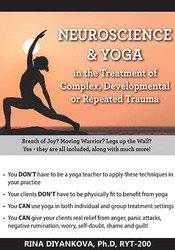Description
The last two decades of neuroscience research have advanced our understanding of the impact of trauma on our brain and nervous system. It showed us that regular talk therapy is not enough to treat the impact of trauma, because it lives in structures of the brain that do not respond to the words. We also learned that body-based practices like yoga have a very positive impact on the health and well-being of trauma survivors.
This recording will bring you up-to-date on the latest and most relevant neuroscience research as it relates to trauma. It will also help you demystify yoga and understand how it can help. You will learn specific techniques and tools that you can use in individual and group work with your clients, as well as teach them and encourage the use of those tools outside of your office. You don’t have to be a yoga teacher to integrate those techniques – they are simple and accessible to you and your clients regardless of physical or other limitations.
What You Should Have on Hand
- Yoga/exercise mat
- Water bottle
- Wear comfortable clothing
CPD
CPD
- PESI Australia, in collaboration with PESI in the USA, offers quality online continuing professional development events from the leaders in the field at a standard recognized by professional associations including psychology, social work, occupational therapy, alcohol and drug professionals, counselling and psychotherapy. On completion of the training, a Professional Development Certificate is issued after the individual has answered and submitted a quiz and course evaluation. This online program is worth 6.5 hours CPD for points calculation by your association.
Faculty
Healing Trauma
Irina Diyankova, Ph.D., RYT-200, is a licensed psychologist in private practice in Knoxville, TN and a registered yoga teacher. She specializes in the treatment of complex and developmental trauma, including PTSD, dissociative disorders, and anxiety & mood disorders. Dr. Diyankova completed her yoga teacher training in Subtle Yoga® with Kaoverii Weber in Asheville, NC. Currently, she is studying for the 500 hour yoga teacher certification with the Himalayan Institute in Honesdale, PA. she also completed part of her yoga studies with the Himalayan Institute in Allahabad, India.
Dr. Diyankova received her undergraduate degree in psychology from Moscow State University, and her M.S. in psychology and Ph.D. in counseling psychology from Iowa State University. She has made numerous presentations on trauma and yoga to clinical audiences in the United States, United Kingdom, Mexico, and Russia. She also maintains a blog, www.healingt.blogspot.com, that highlights the holistic approach she takes to trauma treatment. Learn more about Dr. Diyankova at www.dr-irina.com
Speaker Disclosures:
Financial: Irina Diyankova maintains a private practice. She has an ownership interest in Healing Trauma: Yoga for Healing Trauma online classes. Dr. Diyankova receives a speaking honorarium from PESI, Inc. She has no relevant financial relationships with ineligible organizations.
Non-financial: Irina Diyankova is a member of the American Psychological Association.
Objectives
- Analyze the neuroscience research regarding the impact of trauma on the brain and nervous system as it relates to clinical treatment.
- Analyze the “window of tolerance” and how to use it to inform treatment planning and interventions.
- Provide psychoeducation to clients regarding the specific characteristics of yoga that help reduce symptoms of trauma.
- Utilize yoga techniques to help improve clinical outcomes related to specific diagnosis.
- Demonstrate specific yoga techniques to use with clients in individual and group treatment settings.
- Teach clients about the clinical benefits, limitations and potential risks of utilizing yoga techniques in a clinical setting.
Outline
Neuroscience of Trauma
- How the brain and nervous system are affected during trauma
- Window of tolerance
- Brain structures implicated in PTSD
- Storage of traumatic vs. normal memories in the brain
- Inability to process
What Makes Yoga Suitable for Trauma Survivors?
- Brief introduction to yoga
- Research findings and limitations
- What yoga CAN and CANNOT accomplish in the treatment of trauma
- Importance of focusing on the present moment
- Increase the ability to tolerate pain and discomfort
- Calm down the amygdala and sympathetic nervous system
- Shift brain from negative bias to positive focus
Specific Yoga Techniques and Clinical Applications (with Lab)
- Breath of Joy
- Moving Warrior poses
- Simple vinyasa (with visualization)
- Meditation with mantra
- Legs up the wall
- Using yoga in individual treatment
- Using yoga in group treatment
- Limitations and potential risks
Educating Clients
- Importance of personal yoga practice
- Use neuroscience knowledge to explain the impact of trauma and usefulness of yoga
- Referrals to appropriate classes
- Teach one skill and encourage practicing it
Target Audience
Counselors, Psychotherapists, Social Workers, Case Managers, Marriage & Family Therapists, Addiction Counselors, Nurses, Nurse Practitioners, Clinical Nurse Specialists, Other Mental Health Professionals, Occupational Therapists & Occupational Therapy Assistants


